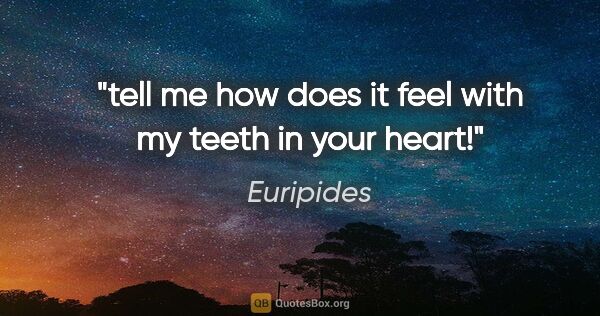Teeth Quotes (page 14)
Though the man-apes often fought and wrestled one another, their disputes very seldom resulted in serious injuries. Having no claws or fighting canine teeth, and being well protected by hair, they could not inflict much harm on one another. In any event, they had little surplus energy for such unproductive behavior; snarling and threatening was a much more efficient way of asserting their points of view.
Arthur C. Clarke
How big are souls anyway?" asked Coraline. The other mother sat down at the kitchen table and leaned against the back wall, saying nothing. She picked at her teeth with a long crimson-varnished fingernail, then she tapped the finger, gently, tap-tap-tap against the polished black surface of her black button eyes.
Neil Gaiman
What did Nabokov and Joyce have in common, apart from the poor teeth and the great prose? Exile, and decades of near pauperism. A compulsive tendency to overtip. An uxoriousness that their wives deservedly inspired. More than that, they both lived their lives 'beautifully'--not in any Jamesian sense (where, besides, ferocious solvency would have been a prerequisite), but in the droll fortitude of their perseverance. They got the work done, with style.
Martin Amis
There are some dogs which, when you meet them, remind you that, despite thousands of years of man-made evolution, every dog is still only two meals away from being a wolf. These dogs advance deliberately, purposefully, the wilderness made flesh, their teeth yellow, their breath a-stink, while in the distance their owners witter, "He's an old soppy really, just poke him if he's a nuisance," and in the green of their eyes the red campfires of the Pleistocene gleam and flicker.
Neil Gaiman
One day Bird had approached his father with this question; he was six years old: Father, where was I a hundred years before I was born? Where will I be a hundred years after I die? Father, what will happen to me when I die? Without a word, his young father had punched him in the mouth, broke two of his teeth and bloodied his face, and Bird forgot the fear of death.
Kenzaburo Oe
There is this difference between the growth of some human beings and that of others: in the one case it is a continuous dying, in the other a continuous resurrection. One of the latter sort comes at length to know at once whether a thing is true the moment it comes before him; one of the former class grows more and more afraid of being taken in, so afraid that he takes himself in altogether, and comes at length to believe in nothing but his dinner: to be sure of a thing is to have it between...
George MacDonald


